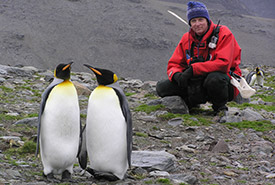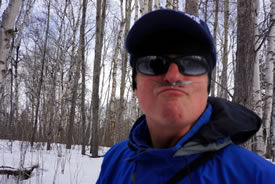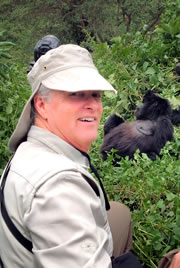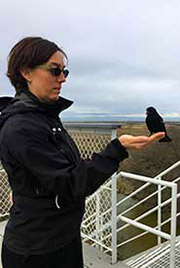We live on a green planet: An interview with Brian Keating (Part Two)

Brian Keating, Antarctica (Photo courtesy of Brian Keating)
This is part two of a two-part interview with Brian Keating, who has dedicated his life to promoting a conservation ethic and raising awareness about the natural world. He has travelled the world in search of great nature stories, and used his role as head of conservation outreach at the Calgary Zoo to support environmental projects across the globe. For part one of this interview, click here.
Lesley Marian Neilson (LMN): How would you describe your approach to conservation outreach and education?
Brian Keating (BK): I always believed that if you are going to affect people’s behaviours, you have to get into their heart first. You have to inspire them. Get them excited about what nature is all about. What I learned working at the zoo for so many years is that the public really represents a population that doesn’t, to a large degree, really understand the importance of intact ecosystems. So, I believe that inspiration is the route to affect change. I’ve always believed that.
About 15 years ago on the front page of The Globe and Mail, there was a little article written by somebody who said that people my age — I’m 61 now — would have spent 80 percent of our unstructured time playing outside as kids. Messing about in the woods, by the creek, on the beach, by the pond, by the lake — just being outside. That statistic today, according to this article, is five percent.

Brian Keating's "moosestache" (Photo by NCC)
When I read that article, I remember having this gut reaction — it scared me. That’s when I started writing children’s books. I’ve written five now. The idea is to get kids between the ages of eight and 15 excited about nature, to get them thinking about the joy of discovery, of being out there and investigating and asking questions, and looking and being quiet and basically just developing that attraction to nature. I worry that now we’re playing with a great unknown experiment [with the young generation] of not turning people on to the very stuff that makes us human.
When I speak to little kids, I talk about the fact that all we are, as humans, is well-dressed, upright, big-brained gophers. We need everything that every other vertebrate needs. We need clean air, productive soil and clean water. Without that, we have nothing. We are valueless and we are doomed.
I try to get people to think about the importance of intact ecosystems, which keep the air clean, the water pure and the soil productive. I think we’ve got a big challenge ahead of us — to get people turned back on to nature and thinking about its value.
Ten years ago, I picked up Last Child in the Woods, Richard Louv’s book. Now I always bring a copy with me and I talk about his philosophy. He writes that about one in three kids in America being obese. We have attention deficit issues in schools. We have plain attention issues. We’ve got anger issues and all kinds of social issues.
Richard Louv believes that a lot of those come down to the fact that we don’t go outside anymore. We don’t walk in the woods. Yet studies have shown that people feel better after they’ve gone for a walk in the woods. Our brains work better after we’ve been out there in the woods. It appears that we’ve got some kind of biological affiliation to green environments. In our built-up cities, we are isolated from those environments and I think it has huge detrimental effects.

Brian Keating with gorillas (Photo courtesy of Brian Keating)
LMN: When you take people on nature tours, do you see a transformation in them by being outside, having authentic nature experiences?
BK: Without question. I often see a change in people. Some people who come out with me on their first “nature tour” end up coming with me on virtually all of the tours I lead, down to the Antarctic and to Africa and up to the Arctic. They realize the fullness of the experience in a trip that takes them out of their comfort zone and into a wild landscape that offers such variety and such excitement. It’s like Christmas morning every day when you are on some of those trips. I’ve seen people join bird watching clubs or taken special interest in conservation organizations like the Nature Conservancy of Canada.
It opens up an aspect of travel that people never thought of, and the beauty of the world we still live in. You hear a lot about terrible things happening to planet Earth — and believe me there are terrible things happening — but the world is still a green place. There still are landscapes that are rich with abundance, and I think we have to celebrate the glass being half full. These trips do exactly that. You have to stimulate people in a positive way to affect change.
LMN: What is your favourite part about giving presentations?
BK: I love seeing an eager audience that is obviously with me in heart and spirit. I really enjoy the questions that are asked afterwards. I find it exciting to show people aspects of nature they have never thought of before.
Many of my stories relate to our own Canadian backyard, and I definitely enjoy showing people something that’s unique and exciting about it. I also like to show what’s going on internationally. We live on a green planet and that’s important to share and celebrate.
To listen to Brian Keating speak and to learn more about Nature Talks, click here.


